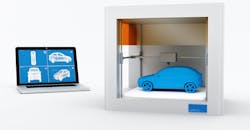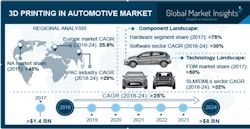3D Printing Will Grow into an $8 Billion Market for the Auto Industry by 2024
3D printing (or Additive Manufacturing) will grow by 25% annually from 2018 to 2024, making it worth more than $8 billion by 2025, according to forecasts by Global Market Insights Inc. The automotive 3D printing market is being propelled by the rise in the number of government and industry initiatives to sponsor additive manufacturing technology. Several countries have developed national programs to support the university-level research. For instance, the Canadian government has launched the Industrial Research Assistance Program (IRAP) to drive the use of 3D printing among small- and medium-sized organizations. This is encouraging organizations to adopt the cutting-edge technology to reduce the cost of operation and increase the productivity.
The increasing customer demand for innovations and lower prices across customized products is also fostering the automotive 3D printing market. Additive manufacturing does not require specialized tooling, nor does it impose pressure on minimum lot sizes. Moreover, it also let companies manufacture products in any sequence. It also lets auto companies involve customers in developing individual products by personalizing exterior designs according to the customer requirements.
Electron Beam Melting (EBM) is expected to grow at 28+% annually through 2024. It uses high-power electron laser to melt and fuse metal alloy powders to make auto components based on electronic data. The laser managed by electronic foils has extremely fast and accurate beam control, letting manufacturers maintain numerous melting points simultaneously. Furthermore, the laser heats the powder bed to the best temperatures for each specific material. Thus, parts made using EBM are free from residual stress.
Manufacturing is estimated to emerge as the most lucrative application of 3D printing. It is anticipated to grow at 30% annually during the forecast timeline. The market is driven by the superior properties and cost benefits offered by 3D printing technology in the manufacturing. It increases manufacturing efficiencies by eliminating the product assembly stage across the manufacturing cycle. The traditional manufacturing process is characterized by several production stages and interconnected storage of semi-finished assemblies, resulting in longer lead times. 3D printing manufacturing, however, is shorter and faster as several stages are combined into a single production step. This eliminates the need for intermediate material handling and intralogistics transport costs.
The Asia Pacific automotive 3D printing market is anticipated to increase by 29+% annually through 2024. That growth is being driven by the increasing investment by public and private establishments. The industrialized economies, along with emerging nations in the region, are exploring various opportunities for advancing 3D printing in the auto sector to strengthen its productivity and competitiveness. Countries including India and China have invested heavily to commercialize the technology in the automotive sector. China, for example, has been investing in additive manufacturing for over a decade,/ and its authorities have committed millions of dollars to a seven-year project aimed at advancing the technology.
Major companies operating in the automotive 3D printing market are Ponoko Ltd., Hoganus AB, Exone, Voxeljet AG, Arcam, Startasys, Autodesk, 3D Systems, Materialise, Nano Dimension, Protolabs, SLM Solutions Group, Electro Optical Systems, Concept Laser, and Renishaw Plc. The companies operating in the market attract major investments to capitalize on untapped market opportunities. The major players are working with other expert companies in the market to integrate 3D printing into their manufacturing cycle and develop new product offerings to gain a competitive advantage over their competitors.
About the Author
Stephen Mraz
Senior Editor
Steve serves as Senior Editor of Machine Design. He has 23 years of service and has a B.S. Biomedical Engineering from Steve was a Flight officer in the U.S. Navy. He is currently responsible for areas such as aerospace and medical.


